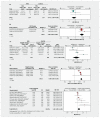Nonnutritive sweeteners and cardiometabolic health: a systematic review and meta-analysis of randomized controlled trials and prospective cohort studies
- PMID: 28716847
- PMCID: PMC5515645
- DOI: 10.1503/cmaj.161390
Nonnutritive sweeteners and cardiometabolic health: a systematic review and meta-analysis of randomized controlled trials and prospective cohort studies
Abstract
Background: Nonnutritive sweeteners, such as aspartame, sucralose and stevioside, are widely consumed, yet their long-term health impact is uncertain. We synthesized evidence from prospective studies to determine whether routine consumption of non-nutritive sweeteners was associated with long-term adverse cardiometabolic effects.
Methods: We searched MEDLINE, Embase and Cochrane Library (inception to January 2016) for randomized controlled trials (RCTs) that evaluated interventions for nonnutritive sweeteners and prospective cohort studies that reported on consumption of non-nutritive sweeteners among adults and adolescents. The primary outcome was body mass index (BMI). Secondary outcomes included weight, obesity and other cardiometabolic end points.
Results: From 11 774 citations, we included 7 trials (1003 participants; median follow-up 6 mo) and 30 cohort studies (405 907 participants; median follow-up 10 yr). In the included RCTs, nonnutritive sweeteners had no significant effect on BMI (mean difference -0.37 kg/m2; 95% confidence interval [CI] -1.10 to 0.36; I2 9%; 242 participants). In the included cohort studies, consumption of nonnutritive sweeteners was associated with a modest increase in BMI (mean correlation 0.05, 95% CI 0.03 to 0.06; I2 0%; 21 256 participants). Data from RCTs showed no consistent effects of nonnutritive sweeteners on other measures of body composition and reported no further secondary outcomes. In the cohort studies, consumption of nonnutritive sweeteners was associated with increases in weight and waist circumference, and higher incidence of obesity, hypertension, metabolic syndrome, type 2 diabetes and cardiovascular events. Publication bias was indicated for studies with diabetes as an outcome.
Interpretation: Evidence from RCTs does not clearly support the intended benefits of nonnutritive sweeteners for weight management, and observational data suggest that routine intake of nonnutritive sweeteners may be associated with increased BMI and cardiometabolic risk. Further research is needed to fully characterize the long-term risks and benefits of nonnutritive sweeteners. Protocol registration: PROSPERO-CRD42015019749.
© 2017 Canadian Medical Association or its licensors.
Conflict of interest statement
Competing interests: Jonthan McGavock has received speaker fees from Medtronic. No other competing interests were declared.
Figures


Comment in
-
Süßstoffe machen nicht schlanker.MMW Fortschr Med. 2017 Oct;159(18):35. doi: 10.1007/s15006-017-0169-2. MMW Fortschr Med. 2017. PMID: 29071621 German. No abstract available.
-
The importance of study design in the assessment of nonnutritive sweeteners and cardiometabolic health.CMAJ. 2017 Nov 20;189(46):E1424-E1425. doi: 10.1503/cmaj.733381. CMAJ. 2017. PMID: 29158457 Free PMC article. No abstract available.
-
Response to "The importance of study design in the assessment of nonnutritive sweeteners and cardiometabolic health".CMAJ. 2017 Nov 20;189(46):E1426. doi: 10.1503/cmaj.733441. CMAJ. 2017. PMID: 29158458 Free PMC article. No abstract available.
-
The timing of ingestion may influence the effect of nonnutritive sweeteners on cardiometabolic health: a potentially overlooked factor.CMAJ. 2017 Nov 20;189(46):E1427. doi: 10.1503/cmaj.733416. CMAJ. 2017. PMID: 29158459 Free PMC article. No abstract available.
References
-
- Johnson RK, Appel LJ, Brands M, et al. Dietary sugars intake and cardiovascular health: a scientific statement from the American Heart Association. Circulation 2009;120:1011–20. - PubMed
Publication types
MeSH terms
Substances
LinkOut - more resources
Full Text Sources
Other Literature Sources
Medical
